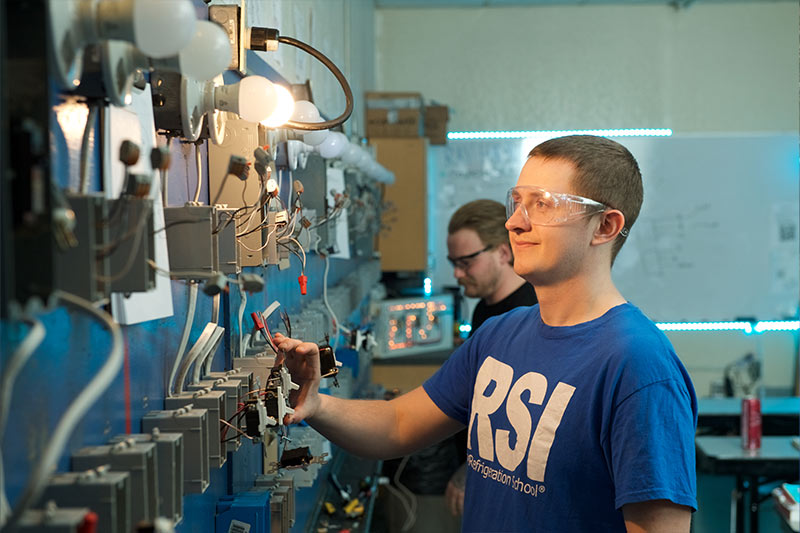
Are you interested in learning more about becoming an electrician? Let’s start by reviewing what basic electrical theory is and how it will be useful in your new electrician career.
What is Basic Electrical Theory?
Electricity is the movement of charge, from positive to negative. Electricity is the flow of electric current along a conductor.
The electric current forms free electrons that transfer from one atom to the next. There are two types of electric current, AC and DC:
Alternating Current (AC) – the electric current changes direction periodically. AC produces high voltages needed for long transmission. Alternating current is usually found in power plants.
Direct Current (DC) – the electric current flows in one direction with a constant voltage. The most portable devices use DC power.
Get Started on the Path to a New Career
Fill out our form to learn how we can help you change your life.
What are the Primary Parameters of Electricity?
There are three primary electrical parameters that include voltage, current and resistance.
The Volt – the force that is put on the free electrons causing them to flow, also the unit of pressure that pushes the current through electrical circuits. The volt is the amount of force required to push a current one ampere through a conductor with a resistance of one ohm.
The Ampere – the flow rate of electric current.
The Ohm – the unit of resistance in a conductor. The three variables that determine the amount of resistance in a conductor are the size, material, and its temperature.
The General Laws of Electricity
During your Electrical Applications program at RSI, you will learn about the fundamentals of electricity and review the general laws below:
Ohm’s Law is the foundational equation for electricity and defines the correlation between electric current, voltage, and the resistance in a conductor. V = I x R; V = volts, I = amps, R = ohms.
Watt’s Law – defines the relationship between power, voltage and current. Power in a circuit is a product of the voltage and current. Watt’s Law is P = I x V; I = current, P = power, V = voltage
Faraday’s Law – helps us predict how a magnetic field would interact with an electric circuit to produce an electromotive force.
Kirchhoff’s Voltage Law – the algebraic sum of the voltage in a closed loop is always equal to zero.
Kirchhoff’s Current Law – current into a node will equal the current out of the node.
How Do You Learn More about Electricity?
If learning about basic electrical theory is interesting, you may find the Electrical Application program at RSI intriguing. During this program, you will learn about mechanical and electrical principles, residential and commercial wiring applications, voice, video and data cabling systems, and the application on motors, lighting, devices, and other types of transformers.
In as little as 7 months, you can learn all about electricity and start working as an electrician apprentice. Utilize your curiosity to start a challenging and rewarding career as an electrician.
Is it time to take the first step toward a career as an electrician> If so, RSI will be with you every step of the way.
Want To Learn More?
If you are interested in learning more about electrical applications and technologies, The Refrigeration School has trade school programs that can equip you with the skill and expertise you need. Call us today at (602) 607-0024 to learn more about our Electrical Application program.

